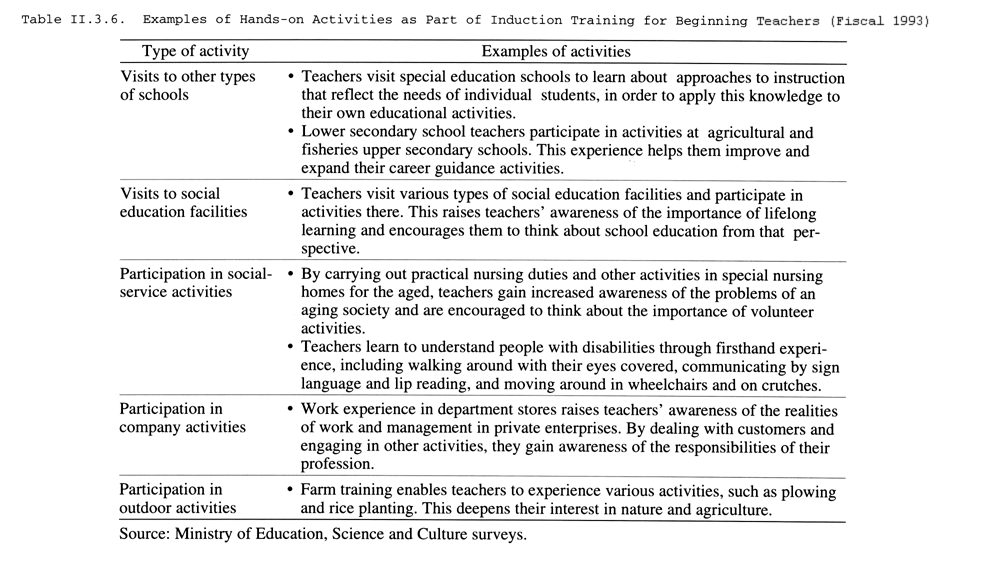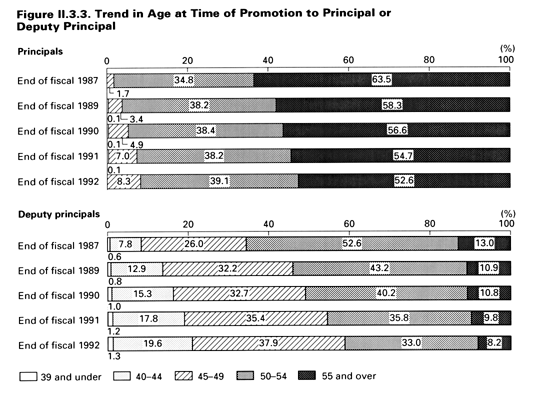| Home > Policy > White Paper, Notice, Announcement > White Paper > JAPANESE GOVERMENT POLICICIES IN EDUCATION, SCIENCE AND CULTURE 1994 > PART II Chapter 3 Section 10 4 | ||
The establishment of a suitable basic order and the achievement of efficient school management are vital both to enable teachers to apply their ideas and ingenuity to instruction and to ensure an appropriate response to student guidance issues, such as refusal to attend school, bullying, and school violence. To create such an environment, it is important to work toward the improvement of school management. Priorities include development of a structure that enables all teaching staff and other personnel to cooperate under the principal's leadership, appropriate enhancement of the apparatus for allocating duties among coordinating and advising teachers, maintenance of staff discipline, appropriate management of staff meetings, and proper monitoring of the wishes of parents and other community residents.
The achievement of school management that is both dynamic and orderly depends on the leadership ability of the principal, who is responsible for school management, and the deputy principal, whose task is to assist the principal. It is essential that people who are truly suited to administrative work are appointed to these positions. Key priorities include the promotion of capable younger teachers to administrative positions and the extension of the period that principals serve in one school so that they can exercise effective leadership.
More younger teachers are now being promoted to senior positions. There has been a dramatic increase in the appointment of younger teachers (44 and under) to the post of deputy principal (from 8.4% at the end of fiscal 1987 to 20.9% at the end of fiscal 1992). There has also been a steady increase in the promotion of younger teachers (49 and under) to the post of principal (from 1.7% at the end of fiscal 1987 to 8.3% at the end of fiscal 1992) ( Figure II.3.3 ). In addition, there has been an increase in the percentage of female principals and deputy principals (from 1.3% at the end of fiscal 1975 to 5.0% at the end of fiscal 1993 in the case of principals, and from 2.1% at the end of fiscal 1975 to 10.8% at the end of fiscal 1993 in the case of deputy principals).
The Ministry of Education, Science and Culture is guiding boards of education to establish personnel management programs for teaching staff based on medium- to long-term perspectives in order to accelerate the promotion of younger teachers to administrative positions, to extend the period that principals serve in one school, and to accelerate the promotion of women to administrative positions.
The need to deal with teachers who have mental problems or are unsuited to their work has become an important issue in recent years. Since teachers are in direct contact with schoolchildren on a daily basis, their mental condition and other factors can easily have a major impact on children's education.
In line with a report titled "Research on Teachers' Mental Health" submitted to the Ministry of Education, Science and Culture in June 1993, in fiscal 1994 the Ministry began to conduct practical research on methods of implementing counseling activities as part of efforts to improve mental-health measures for teachers.


| Back to Top | MEXT HOME |